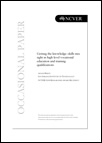Description
This paper aims to contribute to the discussion on the quality and accessibility of underpinning knowledge in competency-based training. It uses the Vocational Graduate Certificate and the Vocational Graduate Diploma in Education Design in a Queensland TAFE institute to examine how the 'traditional' knowledge and theory associated with higher-level qualifications can be accommodated within the framework of competency-based training and assessment. The paper raises some interesting, and provocative, questions about the status and value of these qualifications by comparison with their university counterparts.Summary
About the research
One of the main research objectives of the National Centre for Vocational Education Research (NCVER) is to build the research capacity of the vocational education and training (VET) sector. To assist this objective, NCVER has developed a program whereby new researchers are sponsored to attend its annual ‘No Frills’ conference. Four new researchers were supported to attend this year’s conference in Launceston. One of these awards went to Annie Priest. This paper is based on her presentation at the conference.
Vocational education and trade qualifications on a par with university graduate certificates and graduate diplomas are a relatively recent addition to the VET sector’s stable of offerings. They have emerged as industry demands workers with more than just technical skills and more than just theoretical knowledge.
This paper uses the Vocational Graduate Certificate and the Vocational Graduate Diploma in Educational Design in a Queensland technical and further education (TAFE) institute to examine how the ‘traditional’ knowledge and theory associated with higher-level qualifications can be accommodated within the framework of competency-based training and assessment. The paper raises some interesting, and provocative, questions about the status and value of these qualifications by comparison with their university counterparts.
Key messages
- Universities have been traditionally viewed as providing a theoretical education as a precursor to training for employment, while the VET sector is perceived as offering a practical, workbased education.
- The advent of higher-level vocational qualifications equivalent to some university postgraduate qualifications raises the issue of the inclusion of theoretical knowledge in the competency-based format of the vocational qualification.
- Getting the mix of applied and complex knowledge in higher-level VET qualifications is one of the big challenges of the curriculum development process. Careful attention to the language used in the competencies can ensure that the higher-order thinking and theoretical (underpinning) knowledge is successfully embedded in the qualification.
Tom Karmel
Managing Director, NCVER
